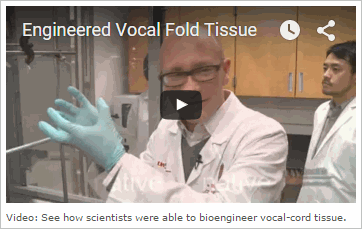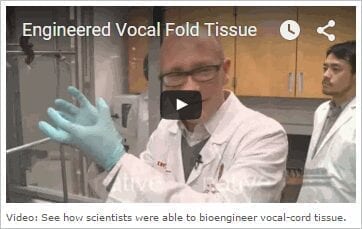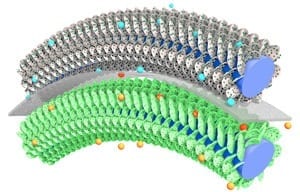
University of Wisconsin scientists have succeeded in growing functional vocal-cord tissue in the laboratory, a major step toward restoring a voice to people who have lost their vocal cords to cancer surgery or other injuries.
Dr. Nathan Welham, a speech-language pathologist, and colleagues from several disciplines, were able to bioengineer vocal-cord tissue able to transmit sound, they reported in a study published today in the journal Science Translational Medicine.
About 20 million Americans suffer from voice impairments, and many have damage to the vocal-cord mucosae, the specialized tissues that vibrate as air moves over them, giving rise to voice.
While injections of collagen and other materials can help some in the short term, Welham says not much can be done for people who have had larger areas of their vocal cords damaged or removed.
Voice is a pretty amazing thing, yet we don’t give it much thought until something goes wrong,” says Welham, an associate professor of surgery in the UW School of Medicine and Public Health. “Our vocal cords are made up of special tissue that has to be flexible enough to vibrate, yet strong enough to bang together hundreds of times per second. It’s an exquisite system and a hard thing to replicate.”
Welham and colleagues began with vocal-cord tissue from a cadaver and four patients who had their larynxes removed but did not have cancer. They isolated, purified and grew the cells from the mucosa, then applied them to a 3-D collagen scaffold, similar to a system used to grow artificial skin in the laboratory.
In about two weeks, the cells grew together to form a tissue with a pliable but strong connective tissue beneath, and layered epithelial cells on top. Proteomic analysis showed the cells produced many of the same proteins as normal vocal cord cells. Physical testing showed that the epithelial cells had also begun to form an immature basement membrane which helps create a barrier against pathogens and irritants in the airway.
Welham says the lab-grown tissue “felt like vocal-cord tissue,” and materials testing showed that it had qualities of viscosity and elasticity similar to normal tissue.
Read more: Wisconsin Scientists Grow Functional Vocal Cord Tissue in the Lab
The Latest on: Vocal-cord tissue
[google_news title=”” keyword=”vocal-cord tissue” num_posts=”10″ blurb_length=”0″ show_thumb=”left”]
via Google News
The Latest on: Vocal-cord tissue
- Tobacco Cessation Improves Radiotherapy: What Your Patients Need to Knowon April 26, 2024 at 5:45 am
Smoking cessation is associated with improved treatment responses, reduced side effects, lower risks of secondary cancers, and increased overall survival.
- 5 Ways A Cat's Purr Is Said To Have 'Healing Powers' On Their Humanon April 25, 2024 at 1:15 pm
Petting your cat can increase serotonin and oxytocin, hormones that make us feel happy and calm. Hearing your cat purr also produces those hormones, which can help to lower your stress levels. So, ...
- Silk, The Ancient Material With High-Tech Possibilitieson April 25, 2024 at 11:47 am
Silk: A World History” describes the unique qualities of silk that make it a sustainable material with a wide variety of applications.
- Celine Dion Doesn't 'Know' When She'll Tour Again Amid Health Struggleson April 22, 2024 at 11:54 am
Celine Dion was diagnosed with stiff-person syndrome in 2022. Here's everything we know, including her current condition and "I Am: Céline Dion" documentary.
- Pet conditions similar to sleep apnea | Pet Peeveson April 21, 2024 at 2:18 am
Stenotic nares, an elongated soft palate, and everted laryngeal saccules are all structural problems that reduce air flow to the lungs of the pet.
- New Orleans singer Paul Sanchez battles back from the brink once againon April 19, 2024 at 4:30 am
After health issues robbed him of his ability to sing, he's found his voice again and maybe a fresh start for his 'Nine Lives' musical ...
- Can’t see a dentist or hygienist? The easiest ways to improve your oral health at homeon April 18, 2024 at 11:36 pm
IF you’re not brushing your gnashers for the benefit of beautiful smile, you’ll know the importance of good oral hygiene for health. Caring for your dental health stops bacteria build-up, which ...
- Papilloma Skin Growths: What to Knowon April 18, 2024 at 8:46 am
A papilloma is a small formation on the skin that looks similar to a skin tag or mole. Having papilloma does not mean you have cancer. Learn about the risks.
- ‘Dear Donor’ project honors organ donors, including Juliet Rose Marcumon April 17, 2024 at 4:15 pm
LEXINGTON, Ky. (WKYT) - An exhibit on display at UK’s Albert B. Chandler Hospital right now honors the selfless sacrifice of organ donation. It’s called the ‘Dear Donor’ project, and it’s a way for ...
- Why Do Cats Purr? The Mystery Behind the Comforting Soundon April 12, 2024 at 5:00 am
T he comforting purr of a cat is a sound that resonates with feline lovers all over the world. Often associated with a sense of peace and therapeutic wellness, the purr of a cat is as enigmatic as it ...
via Bing News










